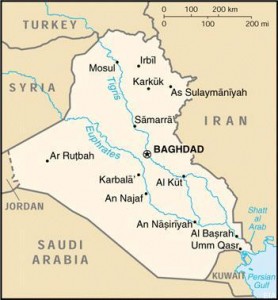
Iraq’s Oil Dispute is Heating Up Again
2012 was a banner year for the oil industry in Iraq. Production has surged, making it to the second largest oil producer in OPEC and some have projected that Iraq could double production by 2020. Unfortunately, with the New Year has come heightened internal tension between the federal government in Baghdad and the Kurdish Regional Government over the control of oil exports.
This struggle is nothing new; the control of Iraq’s oil has been a hot button issue since Saddam Hussein was ousted in 2003. However, infrastructure limitations prevented the Kurdish region from engaging in independent exports, forcing the KRG to send all resources through Baghdad and giving the latter de facto control of the entire industry. That is until April of last year when the Kurds halted the flow of their oil through the national Iraqi pipeline over disputes about the payments for operational costs that they were not receiving from Baghdad.
In July the Kurdish government took a bold step forward by independently exporting small amounts of condensate, a type of light oil, to Turkey in exchange for diesel and kerosene. Their eagerness to increase capability allowed the KRG to offer far more attractive contracts than Baghdad to oil majors Exxon Mobil and Chevron. In early January, Kurdistan began directly exporting crude oil to world markets via Turkish pipelines, yet another blow to Baghdad’s struggle for a monopoly on the industry.
With this growing potential for economic autonomy came warnings of repercussions from Baghdad for companies that support Kurdistan’s “smuggling” industry. ExxonMobil has been given an ultimatum to either stop plans to invest in Kurdish oil or give up its 60% of the Baghdad controlled Qurna-1 field share, and the company has allegedly been talking to buyers.
But Baghdad may not suffer much from the loss of Exxon’s investments. BP has recently agreed to work with the federal government to recover depleted oil fields in the Kirkuk region. The fact that major oil companies are taking opposing sides on Iraq’s internal issues of resource sovereignty is adding a unique dynamic to this situation.
Despite vehement opposition by the federal government, the KRG maintains that its actions are wholly constitutional and that, in fact, it is the actions of the federal government that are illegal. In a piercing statement released earlier this week, the Kurdish government not only emphasized the legality of its actions but also denounced the lack of respect shown to Kurdistan by the federal oil ministry. The statement also voiced disappointment in the federal government for not supporting their industrial success and warned against complete federal control of oil production:
“Citizens of Iraq know all too well the dangers of allowing the country’s abundant oil and gas resources, and its revenues, to fall under the control of a handful of misguided people in Baghdad.”
What would resolve this issue, and actually prevent it from having happened in the first place, would be the passing of the much discussed Iraqi Oil Law. Drafts have been debated and revised since 2007, but has yet to meet parliamentary approval.
The Iraq Oil Law would dictate the finer points of who controls what aspects of the oil industry. But, it doesn’t appear that there will be a law like this in place anytime soon; instead it seems that industrial heavyweights will play a crucial role in determining the fate of Iraq’s oil industry. This fundamental disagreement over how to manage and govern the oil industry, Iraq’s lifeblood, points down a path with no simple resolution. This conflict may only worsen, and oil majors seem keen to take sides.






[…] Iraq’s Oil Dispute is Heating Up Again […]